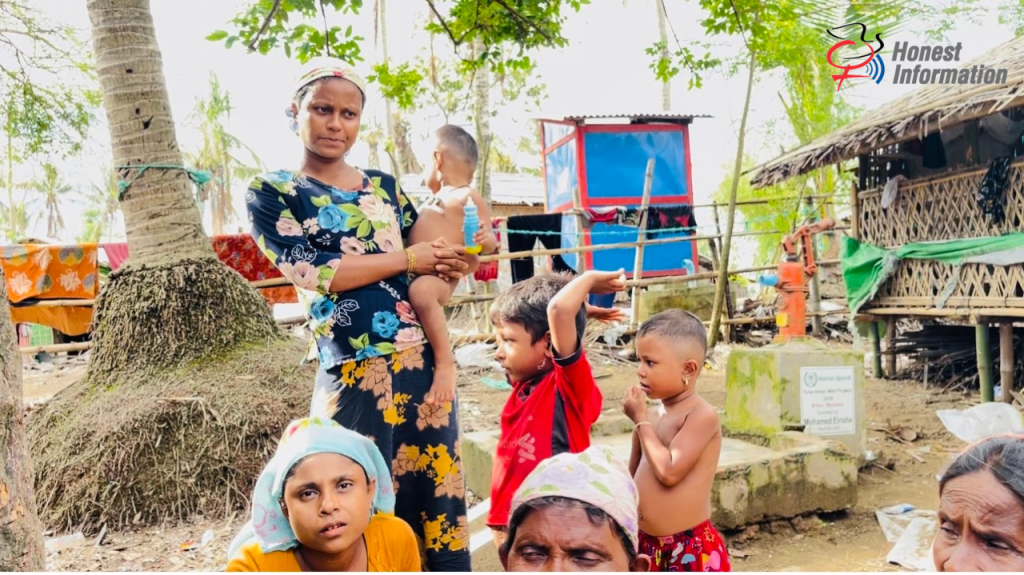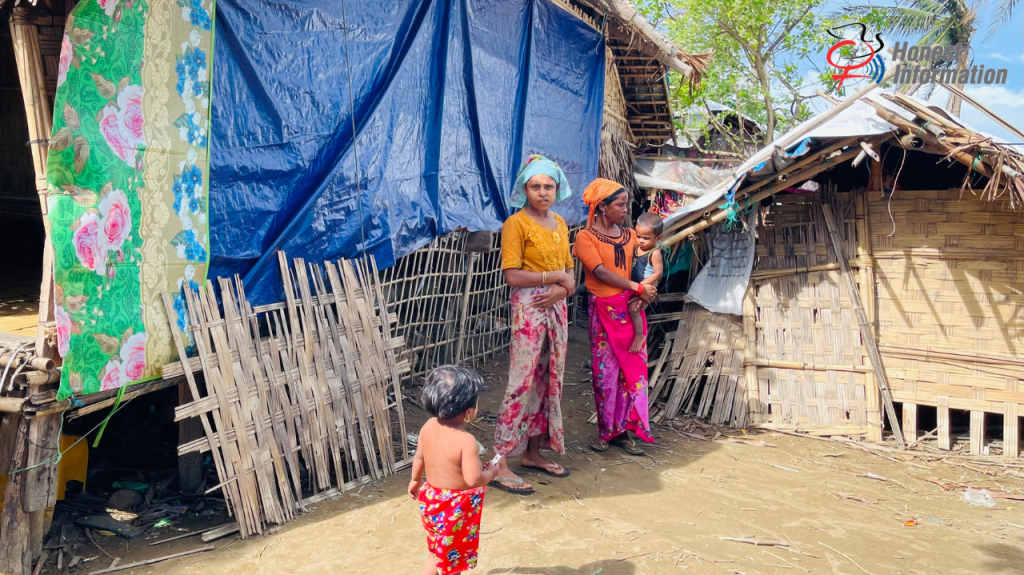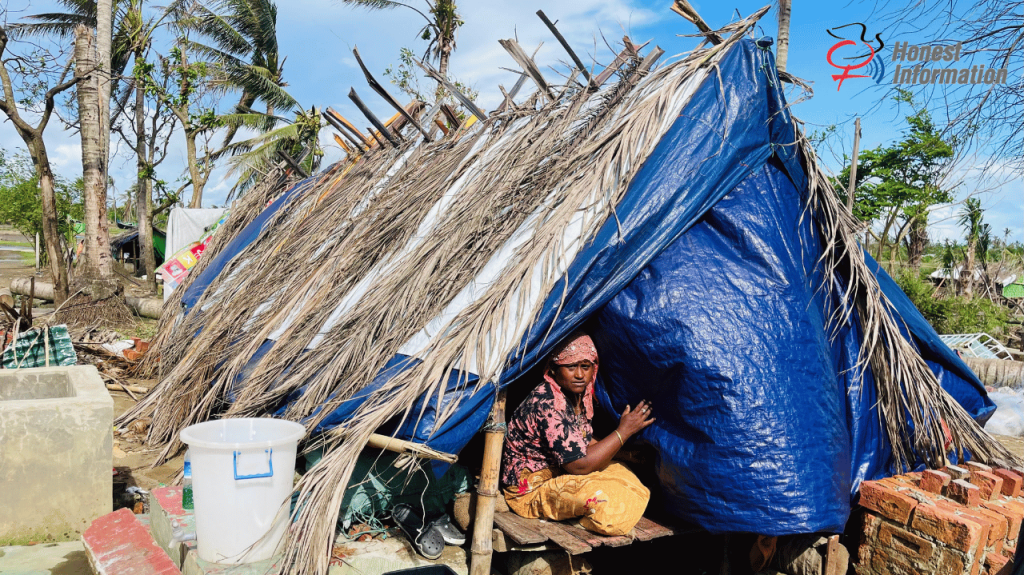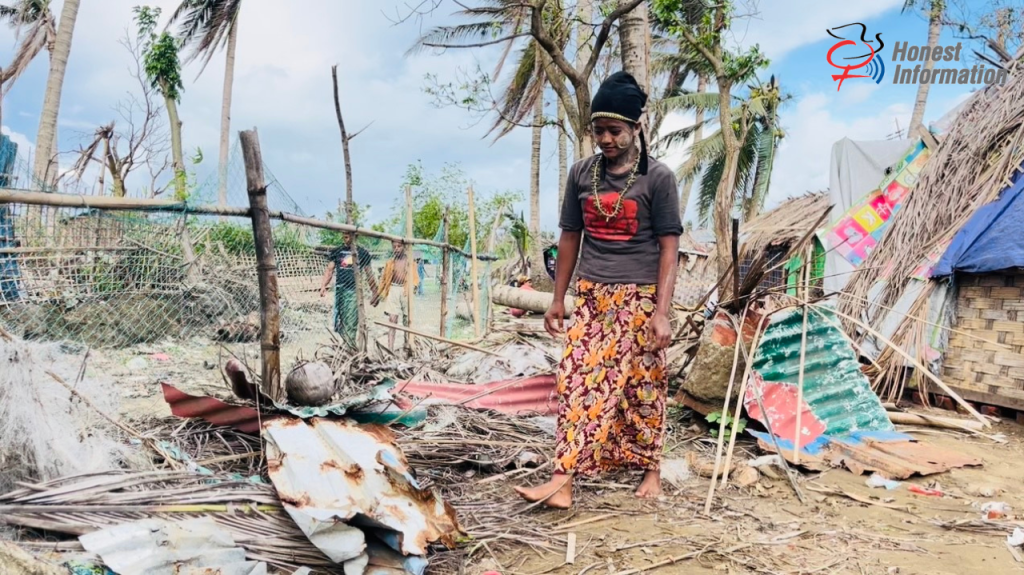Thant Shin Tun
Dried coconut leaves were placed on top of the tarpaulin sheets of the small hut to shield it from the strong winds.
Bamboos serves as the pillars for the house, while the floor is constructed using coconut wood, elevated approximately one foot above the ground.
In a place where a house is nestled amidst various types of litter, a woman gently sways in a hammock, with her skinny baby. She carries a mixture feelings of worry and hope, pondering the possibility of obtaining nutritious food and medicine for her child.
“I don’t have money to visit a doctor or buy milk powder. I have to watch my baby’s suffering”, said Laibeyar BawSawri, the mother of the baby.
This is the plight of a Rohingya family residing in Thae Chaung Ward, Own Daw Village, Sittwe, enduring decades of neglect and oppression under the Burmese government’s control.
Laibeyar BawSawri live with her husband at her parent house, where her husband earns a living through fishing, generating approximately 7,000 Kyat, equivalent to 3.33 USD, per day. This income is primarily allocated towards daily foods, leaving little room to consider the needs of their baby.
It is unfortunate that the baby was born into this poor family, unable to provide adequate care, resulting in the baby suffering from malnutrition.
“My milk is not enough to feed her. I cannot afford milk powder or even a taxi fare to visit a doctor,” she lamented.
The village midwife (birth attendance) who assisted Laibeyar BawSawri during childbirth noted that the baby was born healthy. However, due to their lack of access to healthcare and basic necessities, the baby later became malnourished and visibly underweight.
The 2012 conflict in Rakhine had a direct impact on the Rohingya population. It resulted in severe restrictions on their movement, leading many to flee their villages. The Rohingya people who are living in outside of the city were also restricted from entering the city.
The village where Laibeyar BawSawri resides is also subject to these restrictions. Due to the restriction, the villagers could not access to healthcare and face challenges when trying to leave the village to purchase essentials or travel to the city.
Previously, UN and International Organizations have assisted the Rohinya people who rights such as health care, education and job opportunities have been deprived. However, after the military coup, the military council denied the UN and International Organizations to come and provide support to the Rohingya people, said a Rohingya Woman.
“Mothers like us who are living with restrictions, cannot access to a tetanus vaccine during pregnancy. When it comes to childbirth, we must depend on traditional birth attendants,” stated a mother of three children.
Women who are pregnant and those giving birth encounter numerous challenges, including instances of miscarriage, premature deliveries, and malnourished babies, all as consequences of not receiving the necessary medication and nutrition, a Rohingya man from Own Daw village expressed.
“We have no access to assistance from either the government or international organizations, which forces us to rely on our own means to survive,” he murmured.
In the village where Laibeyar BawSawri lives, there is neither a clinic nor a hospital. “Even though there is a clinic in the nearby Thae Chaung village, there is no nurses or medical staff,” explained Daw Areyaeshar, a 42-year-old who is a mother of Laibeyar BawSawri.
“Likewise, there is no provision of assistance or aid available either within the village or from outside,” she continued with her statement.
“I have nothing, and I haven’t received any support. Some days, I manage to have just one meal, but on others, I go without. My curry is seasoned with only salt. We rely on faith,” Daw Areyae Shartu said as she gazed at her grandchild.
Although Daw Areyae Shartu wants to provide enough food for her daughter and grandchild, but the income from her irregular job cannot even buy enough rice, she groaned.
Similar to Laibeyar BawSawri, there are other Rohingya people who have decided to leave their villages in search of job opportunities in other countries. Despite the immense threats and risks associated with escaping the village, they have to make this difficult choice, mentioned Daw Areyae Shartu.
In addition to the restrictions they face, the impact of Cyclone Mocha has made their lives even more challenging; no just resulting from deprivation of food but the people also lost their house, stated the husband of Daw Areyae Shartu.
“I am growing older, and given the travel restrictions that make it difficult to find work elsewhere, I have no choice but just live with this situation,” he remarked.
UN agencies and international organizations have pledged to provide millions of dollars in support to the Rohingya. However, one of the humanitarian aid workers in the area has raised concerns about whether these aids would have reached to them as intended.
Nevertheless, he continues to emphasize the fact that the military council has continued its restrictions
against International Aid Organization including the UN aids distribution. Thus, the Rohingya population will face with extreme hardships of food shortages, health care and education access. He predicts that these difficulties will persist in the future due to the numerous restrictions imposed by the SAC. These organizations faced even more stringent restrictions following Cyclone Mocha since May 2023.
UNICEF reported that they had extended assistance to 14,000 children under the age of 5, distributed vaccines, and provided nutritious food to 4,000 pregnant and breastfeeding mothers. Additionally, they have provided nutrition to 255 malnourished children in May 2021. However, since then, there have been no updates or indications of any further support being provided.
Despite being born in good health, the lack of access to proper nutrition and medication has resulted in her 2-month-old baby becoming weak and malnourished. Laibeyar BawSawri put her hand on her baby forehead and whispered, “You will be fine when you seek in Alah faith,”.
- ကိုးရီးယားမှာ အောင်မြင်နေတဲ့ ကရင်မိန်းကလေးငယ် အဆိုတော် ဖိုးမူကြီး (သို့မဟုတ်) မာသာထူးဝါး - 25/03/2025
- တစ်ပတ်အတွင်းအမျိုးသမီးဖြစ်ရပ်များ - 22/03/2025
- Media Statement: United Voices from Women’s Rights and LGBTQIA+ Rights Organizations on Dialogues for Gender, Women, Peace, and Security in Myanmar - 21/03/2025






